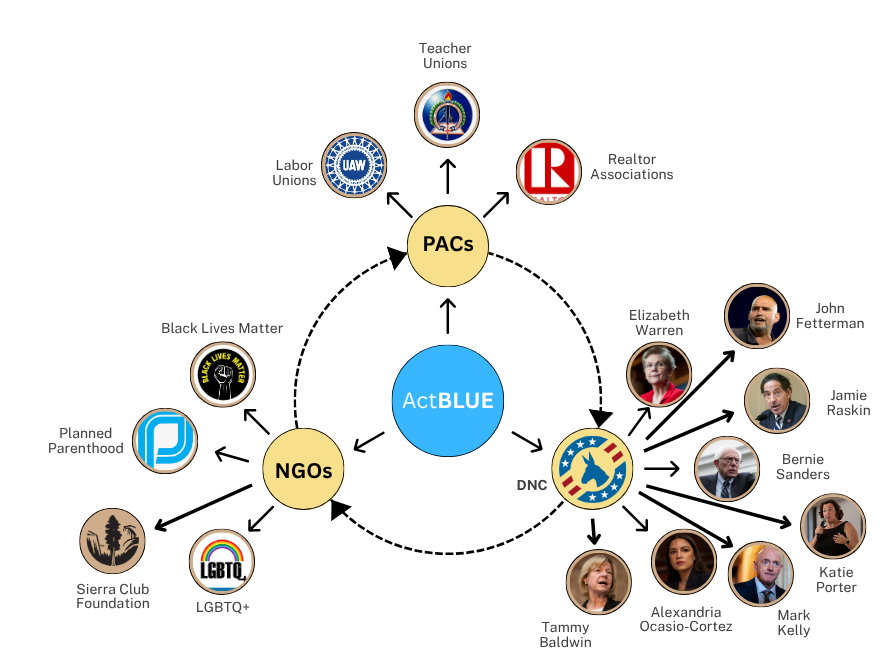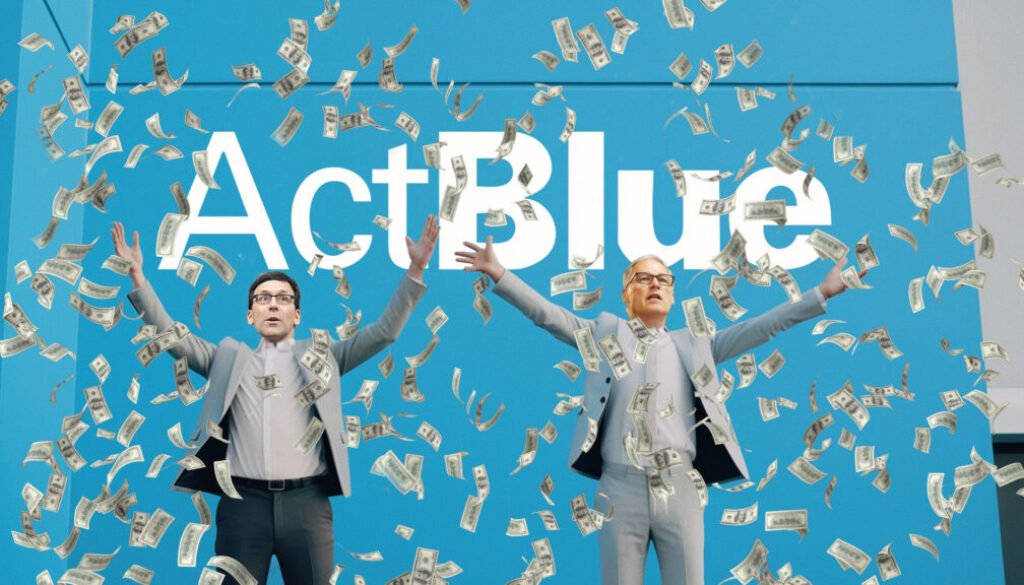Gather ‘round, folks, and let me spin you a tale of digital wizardry and political shenanigans so wild, it could only happen in the swampy circus of American politics. Meet ActBlue, the online fundraising platform that’s basically the Democratic Party’s personal ATM—except this machine might just be rigged to print funny money. Yes, dear reader, we’re diving into a world where small-dollar donations turn into big-dollar scandals, and where the line between grassroots generosity and outright fraud is blurrier than a toddler’s finger painting. Buckle up, because ActBlue isn’t just a website; it’s allegedly the Death Star of Democratic money laundering, and I’m here to break it down with all the sass of a stand-up comic at a roast.
Let’s start with the basics. ActBlue, launched way back in 2004, was supposed to be the good guy—a tool for regular Joes and Janes to toss a few bucks at their favorite progressive candidates or causes. Think of it as a digital tip jar for politicians who love to tweet about “the people.” But oh, how the mighty have fallen—or rather, how they’ve allegedly belly-flopped into a cesspool of corruption. Critics, mostly from the right side of the aisle, claim ActBlue is less a tip jar and more a money-laundering laundromat, washing dirty cash into clean campaign funds faster than you can say “donor fraud.” And who’s running this carnival of chaos? Well, it’s not just one evil mastermind twirling a mustache; it’s a shadowy network of operatives, party bigwigs, and tech-savvy tricksters who’ve turned donation drives into a dark art.

ActBLUE received over $3,800,000,000 in donations in 2024
Picture this: some mysterious fat cat wants to funnel a mountain of cash to a Democratic candidate without anyone noticing. They can’t just write a million-dollar check—oh no, that’s too obvious, and there are pesky laws about donation limits. So, what do they do? They allegedly break that mountain into tiny pebbles, scattering them through ActBlue as thousands of small donations under fake names or stolen identities. This trick, charmingly called “smurfing” (yes, like the little blue cartoon critters), makes it look like a grassroots army of everyday folks chipped in, when really, it’s just one rich goblin behind the curtain. And ActBlue? Critics say it’s the perfect stage for this magic show, with lax verification processes that might as well roll out a red carpet for fraudsters. Now, I’m not saying every donation on ActBlue is a lie—some are surely from sweet grannies giving $5 for climate change—but the whispers of widespread smurfing are loud enough to wake the dead.
Who are the ringleaders of this alleged circus? While no one’s been slapped with a “Fraud Kingpin” crown just yet, the fingers often point to high-ranking Democratic strategists and shadowy donors who’ve mastered the art of digital deception. Think of them as the puppet masters, pulling strings behind ActBlue’s sleek interface while sipping overpriced lattes in D.C. cafes. Then there’s the platform’s leadership itself, accused of turning a blind eye to funky transactions because, well, why bite the hand that feeds you millions for the party? ActBlue rakes in processing fees from every donation, so the more cash flows—legit or not—the fatter their wallet gets. It’s a win-win, unless you’re, say, a voter who thought democracy wasn’t for sale.
Now, let’s talk about why this matters to you, the average person just trying to pay rent and not get scammed by a phishing email. If ActBlue is indeed a money-laundering scheme—and mind you, these are allegations hotter than a TikTok trend—then it’s not just cheating the system; it’s cheating you. Every fake donation distorts the political game, drowning out real voices with fabricated ones. It’s like stuffing a ballot box, but with PayPal instead of paper. And since ActBlue is the Democratic Party’s golden goose, laying eggs of cash for candidates from city council to the White House, this isn’t a small-time hustle. It’s a potential death blow to the idea that elections reflect what actual humans want. Instead, it’s a rigged casino where the house—aka, the Dems—always wins, thanks to their shiny online slot machine.
But wait, there’s more! The fraud doesn’t just stop at fake donors. There are tales of ActBlue being used to siphon funds in ways that would make a mob boss blush. Some say untraceable donations get funneled to shadowy PACs or causes that sound noble but are just fronts for political slush funds. Imagine giving $10 to “Save the Puppies” only to find out it paid for a senator’s yacht party. That’s the kind of sleight-of-hand critics claim ActBlue enables, all while hiding behind the guise of “empowering the little guy.” Oh, the irony—it’s so thick you could spread it on toast.
So, why is ActBlue the big bad wolf in this fairy tale of fiscal folly? Because, if the accusations hold water, it’s not just a tool; it’s a weapon. A weapon that turns democracy into a pay-to-play arcade game, where the Democratic Party loads up on extra lives while everyone else is stuck with a broken controller. It’s evil, my friends, in the way a cartoon villain is evil—cackling as it undermines trust in our already wobbly system. And the worst part? Even if investigations (like those floated by conservative watchdogs up to November 2024) prove something fishy, the damage is done. The money’s spent, the elections are swayed, and we’re left wondering if our vote even matters when a few clever coders and shady donors can game the whole thing.
In the end, what can we do about this digital den of deception? Well, short of storming ActBlue’s servers with pitchforks and dial-up modems, we can demand transparency. Ask questions. Follow the money—or at least try to, before it vanishes into the ether of online transactions. Because if ActBlue is indeed the Democratic Party’s evil money-laundering empire, then ignoring it is like letting a dragon guard the village gold. Sooner or later, everything burns. So, keep your eyes peeled, your wallets close, and your skepticism closer. Democracy might just depend on it—or at least, on us laughing bitterly at the absurdity of it all.
The conclusions presented in this report are drawn from well-established and authoritative sources:
Federal Election Commission (FEC): Detailed filings and itemized reports of contributions processed by ActBlue are available through the FEC’s data portal. (FEC ActBlue Committee Overview)
OpenSecrets: A comprehensive database that offers insights into contributions by candidate and cycle, with dedicated profiles for ActBlue’s financial activities. (OpenSecrets ActBlue PAC Profile)
ActBlue’s Transparency Documents: The organization’s own disclosures provide further insights into its operational model and financial performance. (ActBlue About Page)




